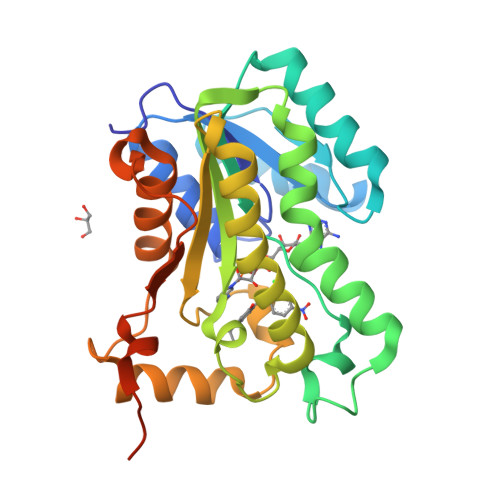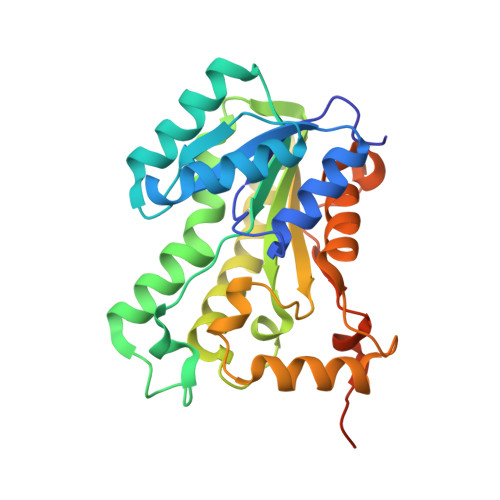Rationalizing the Binding Kinetics for the Inhibition of the Burkholderia pseudomallei FabI1 Enoyl-ACP Reductase.
Neckles, C., Eltschkner, S., Cummings, J.E., Hirschbeck, M., Daryaee, F., Bommineni, G.R., Zhang, Z., Spagnuolo, L., Yu, W., Davoodi, S., Slayden, R.A., Kisker, C., Tonge, P.J.(2017) Biochemistry 56: 1865-1878
- PubMed: 28225601
- DOI: https://doi.org/10.1021/acs.biochem.6b01048
- Primary Citation of Related Structures:
5I7E, 5I7F, 5I7S, 5I7V, 5I8W, 5I8Z, 5I9L, 5I9M, 5I9N, 5IFL - PubMed Abstract:
There is growing awareness of the link between drug-target residence time and in vivo drug activity, and there are increasing efforts to determine the molecular factors that control the lifetime of a drug-target complex. Rational alterations in the drug-target residence time require knowledge of both the ground and transition states on the inhibition reaction coordinate, and we have determined the structure-kinetic relationship for 22 ethyl- or hexyl-substituted diphenyl ethers that are slow-binding inhibitors of bpFabI1, the enoyl-ACP reductase FabI1 from Burkholderia pseudomallei. Analysis of enzyme inhibition using a two-dimensional kinetic map demonstrates that the ethyl and hexyl diphenyl ethers fall into two distinct clusters. Modifications to the ethyl diphenyl ether B ring result in changes to both on and off rates, where residence times of up to ∼700 min (∼11 h) are achieved by either ground state stabilization (PT444) or transition state destabilization (slower on rate) (PT404). By contrast, modifications to the hexyl diphenyl ether B ring result in residence times of 300 min (∼5 h) through changes in only ground state stabilization (PT119). Structural analysis of nine enzyme:inhibitor complexes reveals that the variation in structure-kinetic relationships can be rationalized by structural rearrangements of bpFabI1 and subtle changes to the orientation of the inhibitor in the binding pocket. Finally, we demonstrate that three compounds with residence times on bpFabI1 from 118 min (∼2 h) to 670 min (∼11 h) have in vivo efficacy in an acute B. pseudomallei murine infection model using the virulent B. pseudomallei strain Bp400.
Organizational Affiliation:
Institute for Chemical Biology and Drug Discovery, Department of Chemistry, Stony Brook University , Stony Brook, New York 11794, United States.



















